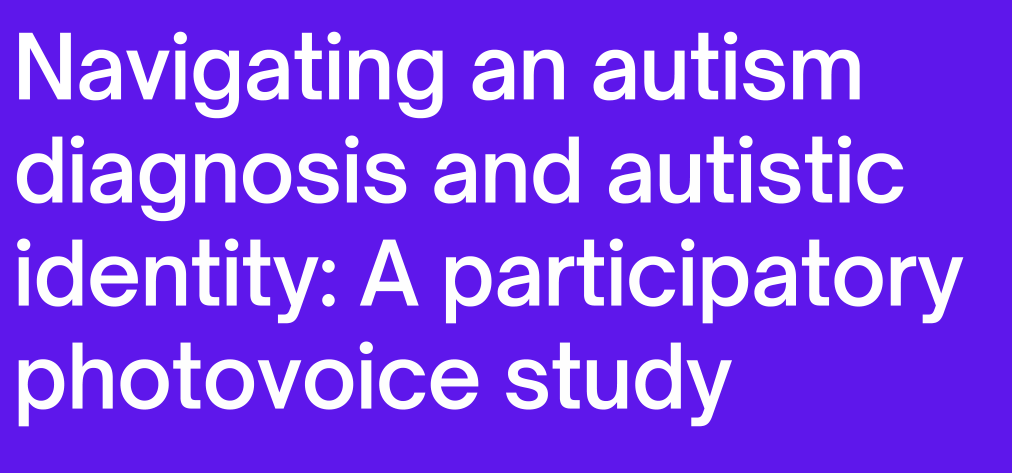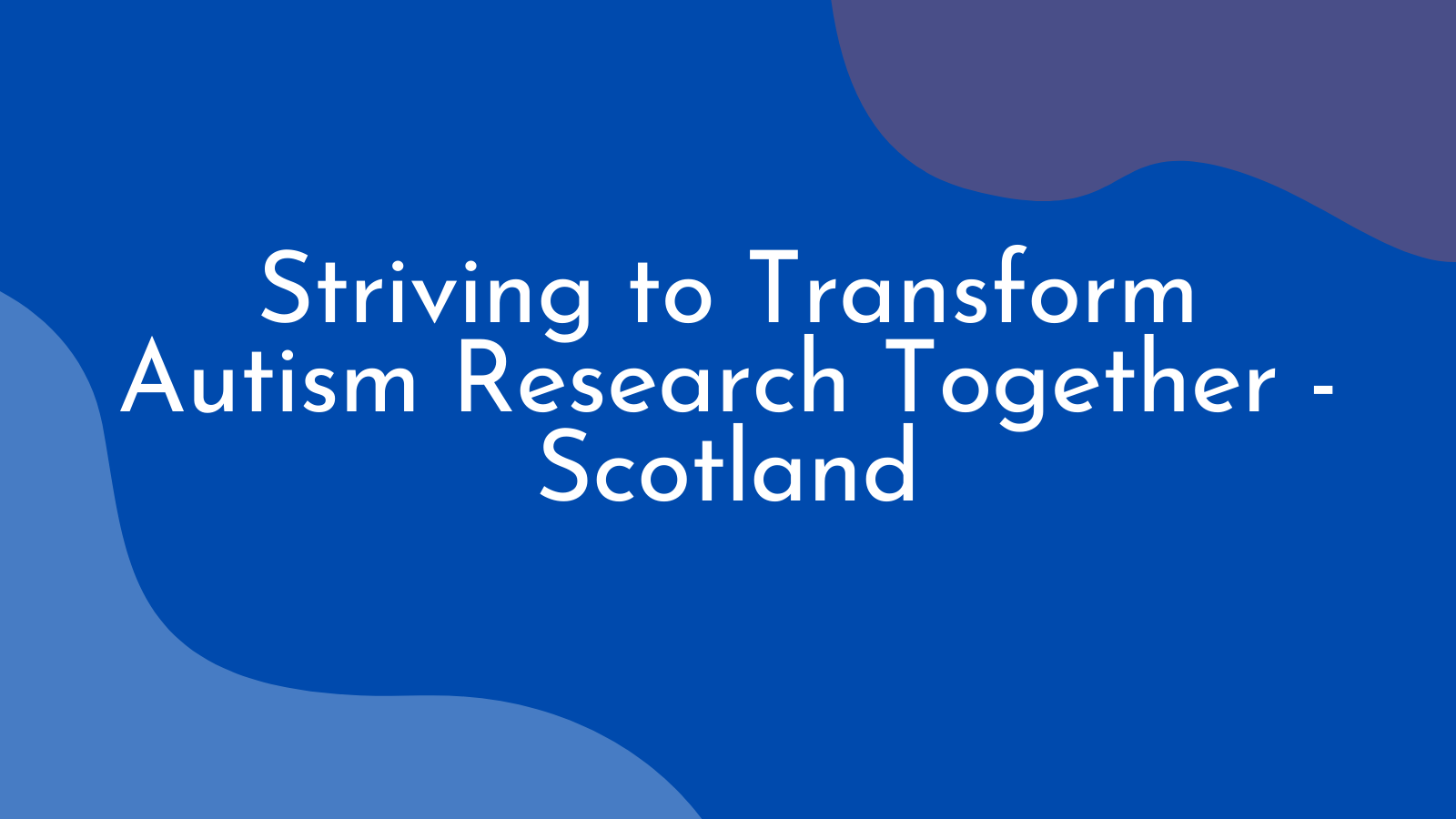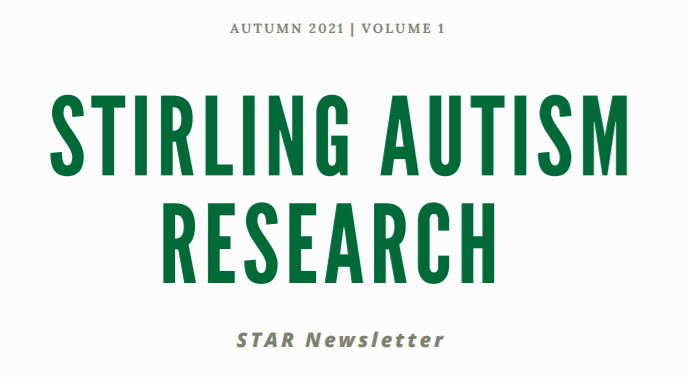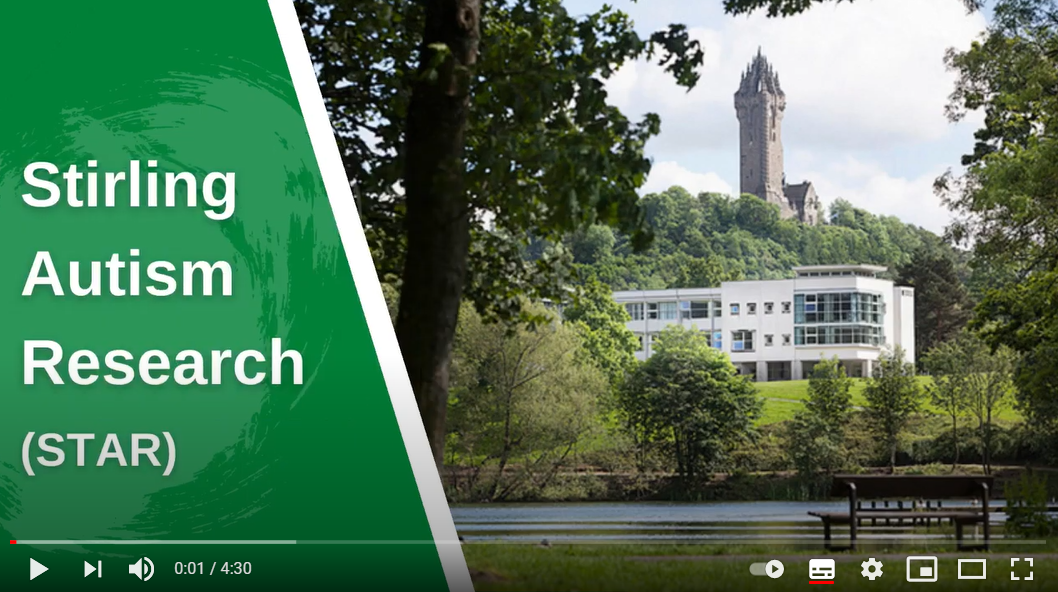-
STAR Autumn/Winter Newsletter 2022
Read all about what the STAR team have been up to over the last few months! Download our latest newsletter here: STAR Newsletter Autumn Winter 2022
-
Autism Europe conference
Dr Eilidh Cage is attending Autism Europe to present recent research on the topic of adult autism diagnosis. You can view/download the poster below to find out more about the project. We are currently writing up this study for publication and hope to share the preprint soon! Autism Europe poster download
-
Survey season!
You may have noticed that at around this time of year, lots of researchers are looking for participants on Twitter! Part of the reason for this is because Masters students are looking for people to help them with their dissertation research. Studying the Autism Research MSc means that students get to investigate a topic of…
-
STAR Statement on a recently funded project at Stirling.
We have recently learned of a newly funded project at the University of Stirling called “The Cortical Head Direction System as a Model for Systems-level Alterations in Three Rat Models of Autism Spectrum Disorder/Intellectual Disability”. The project has been funded by the Simon’s Foundation and is in collaboration with the University of Dundee and McGill…
-
STARTS Network launches!
STARTS – Striving to Transform Autism Research Together-Scotland – is a new network organised by Dr Eilidh Cage, Dr Monique Botha (both University of Stirling) and Dr Catherine Crompton (University of Edinburgh). The network is funded by the Royal Society of Edinburgh for two years. The network aims to bring together autistic people and autism…
-
Spring 2022 Newsletter
We are delighted to share our latest newsletter! Find out what’s been happening with STAR over the past few months, and some of our plans for 2022: Newsletter Spring 2022_v2
-
New video series about our research!
We have recently launched our new video series which aims to explain our research projects in less than five minutes! Our first video discusses Dr Eilidh Cage’s recent paper with collaborators from Royal Holloway and UCL on camouflaging and stigma. You can watch the video on YouTube below: This video was created by Lauren Paterson,…
-
Reflections on a STAR Placement
Recently, Lauren Paterson completed a 10-week placement with STAR as part of her MSc at the University of Stirling. While many of our placement students assist with our research projects, this year we tried a new placement which involved supporting the STAR team with our social media and public engagement activities – something we want…
-
Leverhulme Early Career Fellowship awarded to Dr Monique Botha
We are delighted to announce that Dr Monique Botha has been awarded an Early Career Fellowship from the Leverhulme Trust. The Fellowship will enable Monique to work on a significant piece of work for three years (starting later this year) at Stirling. The research project is called “Fragile Knowledge: Dehumanisation & Interpretation Bias in Autism…
-
INSAR poster: Contextual References as a Mechanism to Support Time-Based Prospective Memory in Autistic Adults
Background: In everyday life, we often need to ‘remember-to-remember’ to do activities in the future (prospective memory). Some of these tasks need to be carried out at a specific time (time-based prospective memory). Because prospective memory tasks are usually carried out during unrelated everyday activities (ongoing tasks), this kind of ‘memory skill’ is very demanding…
-
INSAR panel: Global Insights on Understanding and Reducing Autism Stigma
At INSAR, Dr Botha and Dr Cage co-chaired a panel on autism stigma, which brought together cutting-edge and novel research exploring autism stigma from the perspectives of non-autistic and autistic researchers, using a range of methods, in different settings, from multiple geographic regions. Stigma involves the discrediting of an identity or a negative perception of differentness. Research shows that autism is a stigmatised identity, with…
-
INSAR poster: A Systematic Review of Healthcare Professionals’ Knowledge, Self-Efficacy and Attitudes Towards Working with Autistic People
Background: Recognition, diagnosis and high-quality support for mental and physical health relies on the knowledge, attitudes and confidence of healthcare professionals. However, there is variability among healthcare professionals in different contexts, professions and cultures. While several studies have examined healthcare professionals’ experience of working with autistic people, no systematic review has compiled this evidence. Therefore,…
-
INSAR poster: Longitudinal Investigation of the Impact of Minority Stress and Autistic Community Connectedness on Mental Health in the Autistic Community
Background: The minority stress model (MSM) suggests that marginalised minorities are exposed to excess stress resulting in health inequalities and is useful for understanding the high rate of mental illness in the autistic community. Similarly, intra-community connectedness (being connected to other autistic people) has been shown to weaken the impact of perceived stigma on both…
-
INSAR poster: Seeing in the Mind’s Eye. A Study of Aphantasia in Relation to Episodic Memory and Future Thinking in Autistic Adults
Background: Many autistic people experience difficulties in recalling personally experienced past events (episodic memory). These memory difficulties also extend to thinking about the future (episodic future thinking) and remembering to carry out tasks in the future (prospective memory). These processes require the use of mental visualisation of oneself in past or future. Visualisation skills reflect…
-
INSAR poster: Identity After an Autism Diagnosis: Gender, Self-Esteem and Wellbeing
Background: Autism diagnosis is common in adulthood, particularly for females, and is often noted to be emotionally impactful, with a lack of post-diagnostic support. Personal identity consists of characteristics that define an individual and differentiate them from others. Autistic personal identity is an individual’s sense of whether autism is part of who they are, as opposed…
-
INSAR poster: Autistic Community Connectedness as a Moderator of the Effect of Minority Stress on Mental Health in the Autistic Population
Background: Autistic people have a higher rate of mental illness compared to non-autistic population, and it is suggested by the minority stress model that marginalised minorities are exposed to a greater burden (minority stress), resulting in health inequalities. However, marginalised minorities may also have access to a unique in-group community which also provides a degree…
-
Stirling Autism Research (STAR) at the International Society for Autism Research general annual meeting (INSAR).
Each year INSAR holds a research conference (their general annual meeting) which brings together researchers from all over the world. Members from the Stirling Autism Research (STAR) team will be attending the conference this year and presenting work spanning the topics of healthcare access, mental health and quality of life across the adult lifespan, the…
-
Welcome to Marisa!
A huge welcome to Marisa McKinlay, who has recently joined the STAR team as a PhD student. Marisa will be looking at social issues for autistic adolescents. As an experienced Speech and Language Therapist, she is passionate about supporting communication and how environments can be changed to allow increased social engagement where desired. Her research…
-
Welcome to Dr Botha plus new paper published
We are delighted to welcome Dr Monique Botha to the STAR team as a Post-Doctoral Fellow, funded by the ESRC (Economic and Social Research Council) via the Scottish Graduate School of Social Science. Monique’s research to date has focused on the role of minority stress, stigma, and discrimination in the mental health outcomes of autistic…
Home » News
















